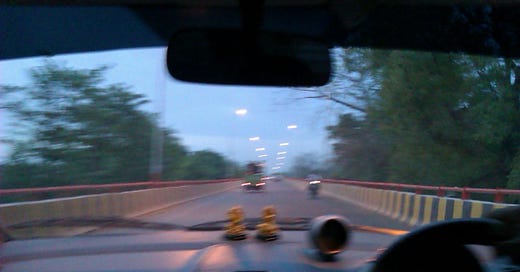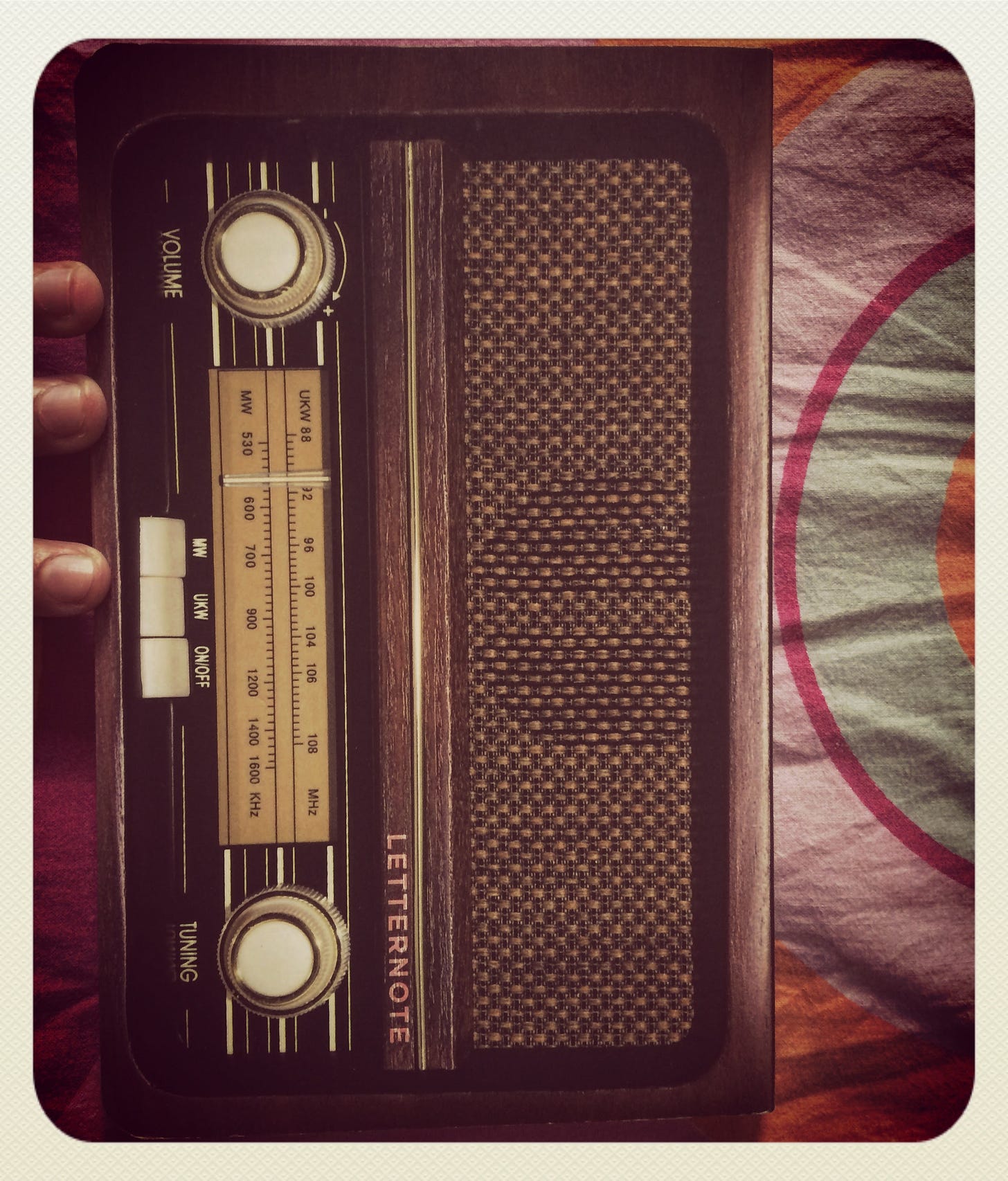#Scurf163: thinking with the radio
going gaga over the radio as a musical nostalgia minting device
I always wanted to be able to play a musical instrument. As luck (or is it laziness) would have it, I was born to a family of musically inclined men and women. None of them formally trained but my father, his six sisters, his parents, and his brothers all knew either how to play something or to just be able to sing a hindustani classical raga even in their sleep.
I grew up in their vicinity.
Old, caved-in tablas strewn in the staircase that led up to our terrace in the ancestral Kanpur house. A sitar, as far as memory can recall, was perched almost gleefully alone in another bend of the same staircase. Sometimes we would have bhajan evenings in the aangan and a dholak, harmonium and manjeera would surface out of ether. There were musical notes strewn across chai-addled antakshari sessions, wedding celebrations would come full circle only after an aunt would sing a “Sajna Aa Bhi Ja” for an absent uncle over the bare strum of an acoustic guitar.
My father’s generation was gifted in the most cultured of ways. Earlier this year, before the dying took over, our family whatsapp group would light up on February-March weekend mornings over conversation about listening to the music of Abba and Boney M. Singing along with the tunes of MSS or Shubha Mudgal. Inviting the mornings into our living rooms with AIR radio welcoming in the ragged, slightly chipped, spaced out music from the 1950s Hindi movies gently cooing from it. The radio as I recall was a constant over the decades.
Growing up in my father's ancestral house in the dry north Indian town of Kanpur, I saw the big obsolete box of a radio set perched beautifully in my grandmother's room. Her crisp mornings would begin at 4 with the white noise cackling in the background as she hummed to herself and cleaned her room. She’d tune into Vividh Bharti or the AIR FM Rainbow, Akashvani not just entertainment, but also for a steady and reliable source of news, and by extension connectivity. The habit rubbed off on my father and his sisters who would even go to the bathroom with their respective Philips or Panasonic transistors.
In 2020, according to a survey the radio had emerged as one of the most credible sources of information for millions of people who were unable to venture outside because of the ongoing lockdown. At that time, I too became inseparable from my mini caravan. A birthday gift from a few moons ago that year, I found myself listening to music, commentary, interview, even adverts on it while cooking, cleaning the house, showering. At times, even while the secluded and fully tuned in activities like reading, or writing, I would tune into a channel at a low enough decibel. The silent, low, almost white noise of the radio would give a genteel, tinny background music to the most mundane of activities.
There was a time when we needed the radio, in a different kind of way — for news and songs that actually nourished our soul and enriched our world view. In 2020 and even beyond that, it has come to occupy the space of a luxury in our middle class lives. It’s more like an aide, an added accessory that exists and is used thus so. The radio transistor stands now as an homage to one of the oldest and most reliable forms of bringing music into our lives as a joint family in Kanpur. It helped us reinforce our loves of old KL Saigal tunes while also coming across the most recent Mukesh ballads.
As I sit on my desk on this cold January morning in 2024, I try to parse through a lost sentimental attachment that glued me to the device as a kid, and as a family. What was once just a relic in our household, a vestige from forgotten times, had thanks to extensive power outages in our city, in the 90s became the central point of excitement and entertainment for my brother and I. When I visited my mourning parents for Diwali in 2023, I found my father listening to Radio Ceylon on his bluetooth speakers. Pleasantly surprised, I walked over to his desk to find that it wasn’t the six year old Caravan but the RCAPS youtube channel that rattled out updates for the day.
We’d be in my father’s car, listening to the radio on trips within the city or on travel road trips and the songs on there would be from nothing later than the sixties. I would then joke with him that songs from Kuch Kuch Hota Hai perhaps would only ever play on AIR when I’d be 65-years-old! Post-liberalisation radio listening for the middle class was an exercise in ablution.
Recently listening to Main Parvaana I was immediately taken back to the old days of consuming music through the radio first. Kajra Re, for instance, is the song I first ever arrived at via the radio because it released around the same time as my class 10 board exams which obviously meant that we didn’t have TV connection at home for that entire year.
Husband grew up listening to BBC Radio, so much so that he learnt and perfected the accent over the years. Over the years even I leaned more towards the BBC side of things and the meaning and definition of the radio continued to evolve. Yet, everything around and about the radio experience remains to be heavily rooted and infused in the underbelly of my hometown living (and breathing and infesting) of Kanpur. The radio as a time machine, as a musical instrument for the melodiously inclined.





